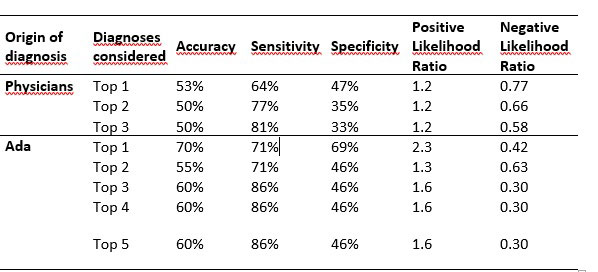Session Information
Session Type: Poster Session D
Session Time: 1:00PM-3:00PM
Background/Purpose: The purpose of this study was to compare the ability of an artificial intelligence-based symptom checker app (Ada) and physicians to determine the presence/absence of an inflammatory rheumatic disease (IRD), solely relying on basic health and symptom-related medical history.
Methods: In this survey study, German speaking physicians with prior rheumatology working experience were asked to determine IRD presence/absence and suggest diagnoses for twenty different vignettes. The vignettes included only basic health and symptom-related medical history from 13 non-IRD and 7 IRD-cases. The vignettes and diagnostic suggestions from Ada were retrieved from a previous study, where patients newly presenting to a rheumatology outpatient clinic used Ada for symptom assessment prior to the physician appointment. IRD detection rate and suggested diagnoses of participants and Ada were compared to the gold standard, the final physicians’ diagnosis, reported on the discharge summary report from the local site.
Results: A total of 132 vignettes were completed by 33 physicians (mean age 39 (standard deviation (SD) 8.2) years, mean rheumatology working experience 8.8 (SD 7.1) years, median 6.0 years). Ada correctly detected IRD status more often compared to physicians (70% vs 53%, P = 0.002) according to top diagnosis (see table). Ada listed the correct diagnosis more often compared to physicians (54% vs 32%, P < 0.001) as top diagnosis as well as among the top 3 diagnoses 59% vs 42%, P < 0.001). Physicians were more likely to correctly detect IRD status with increasing work experience and self-perceived accuracy.
Conclusion: If rheumatologists have to classify patients as IRD or non-IRD based on health and symptom-related medical history, the AI-based Ada app has a higher detection rate of IRDs compared to rheumatologists. Symptom checkers could improve the current referral process by supporting the decision which patients most urgently need an appointment. This could optimize the usage of scarce rheumatology health care resources.
To cite this abstract in AMA style:
Gräf m, Knitza J, Leipe J, Krusche M, Welcker M, Kuhn S, Mucke J, Hueber A, Hornig J, Klemm P, Kleinert s, Aries P, Vuillerme N, Kleyer A, Schett G, Callhoff J. A Symptom Checker App Is Better at Classifying Inflammatory Disease Than Physicians Who Are Presented Identical Information [abstract]. Arthritis Rheumatol. 2022; 74 (suppl 9). https://acrabstracts.org/abstract/a-symptom-checker-app-is-better-at-classifying-inflammatory-disease-than-physicians-who-are-presented-identical-information/. Accessed .« Back to ACR Convergence 2022
ACR Meeting Abstracts - https://acrabstracts.org/abstract/a-symptom-checker-app-is-better-at-classifying-inflammatory-disease-than-physicians-who-are-presented-identical-information/

